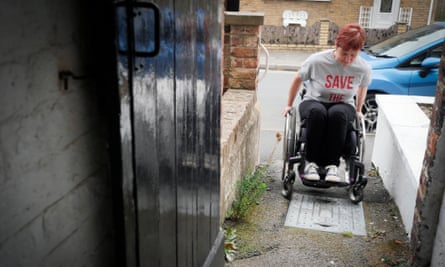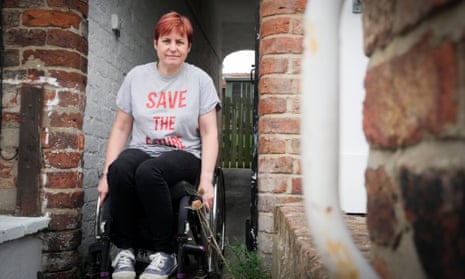One in five British people are suffering erosion of their rights because they are disabled, the government-backed Equality and Human Rights Commission has said in a damning report to the United Nations.
The body cites “deeply concerning” evidence that despite government pledges to improve conditions for the nearly 14 million disabled Britons, their situation is getting worse across the UK.
Its report to the UN committee on disability rights that “more and more disabled people are finding it difficult to live independently and be included, and participate, in their communities on an equal basis”.
More disabled people live in poverty than non-disabled people, and more are bullied in schools, it says. Forty per cent of disabled people do not feel valued by society, according to research by Scope, half feel excluded and only 42% feel the UK is a good place for disabled people to live.
The findings have been backed by disabled people and campaign groups who said “we are slipping back to darker times”. The government responded that it was “committed to building a society which is fully inclusive of disabled people” and that ministers were grasping the problems.
Almost half of all people of pensionable age in the UK are disabled, as are one in five working-age adults. Disability is defined under the 2010 Equality Act as a “physical or mental impairment that has a substantial and long-term negative effect on your ability to do normal daily activities”.
Scope estimates that disabled people spend £570 a month more the average Briton, but the EHRC says they are harder hit by welfare reforms, experience increasing barriers to finding work and are paid less when they do find work. It said Brexit would lead to a further deterioration of the situation.
Kamran Mallick, the chief executive of Disability Rights UK, said: “Any progress made through government initiatives is immediately counterbalanced by a swathe of cuts elsewhere. Help with employment is of little use if people are unable to get to work because their mobility benefits have been taken away.”
The UN criticised the UK’s “laws, regulations and practices that discriminate against persons with disabilities” last year and complained that not enough was being done to protect them from the negative affects of Brexit. Many grassroots projects are EU-funded.
“A year on, we have sadly seen little action or commitment to address the UN’s recommendations,” said David Isaac, the chairman of the EHRC. “Changes to our social security system and health and social care budgets make disabled people feel like second-class citizens and their rights to live independently have been impacted. Everyone has the right to an adequate standard of living and the rights of disabled people must be made a priority if we are to have a fair and equal society.”
Half of the UK’s disabled people work and the number is slowly increasing, but that compares to 81% of the non-disabled population. The government has set a target of getting a million more disabled people into work by 2027, but has been criticised for cutting welfare payments that it argues are holding some back from re-entering the workforce.
Cath Scarlett, a former maths teacher who now uses a wheelchair after being diagnosed with a form of motor neurone disease in 2011, said: “We are facing barriers all the time and it is getting worse.”
She said the school where she had worked made it hard for her to continue teaching, even though she felt she could have done with proper support. Instead of earning £36,000 a year she now survives on £6,000 a year in benefits.

“Physical accessibility is appalling,” she said. “Fifty per cent of my high street in Driffield is inaccessible and until access is improved that will be a massive barrier to people getting on.”
Most of the available work near her in North Yorkshire was unsuitable for many disabled people, she said. “It’s caring, construction, catering, couriers, engineering and a few supermarket jobs. All the office spaces are in Victorian buildings and are upstairs and they don’t have lifts.”
Scarlett was diagnosed aged 42 when “I could do cartwheels and handsprings”. “This could affect anybody at any time,” she said.
Anna Bird, the executive director of policy and research at Scope, said: “It’s a glaring injustice that half of disabled people feel excluded from our society. From poor attitudes to lack of focus from government, and from being overlooked in the workplace to being humiliated on public transport, life for many disabled people is still much tougher than it needs to be. It’s time that changed.”
In response to the EHRC’s report, the government said it had made significant progress, but admitted “there is always more we can do”.
“We’re committed to building a society which is fully inclusive of disabled people across every area of their lives, from transport and housing to healthcare and employment,” a spokesperson said.
“Our response to the UN sets out our progress over the last year, including the creation of a new inter-ministerial group on disability and society, which will drive progress against the implementation of the UN convention.”
